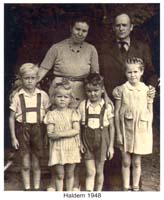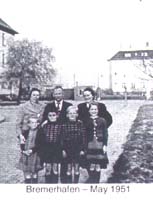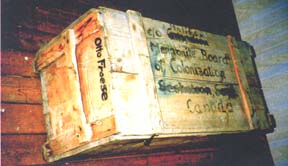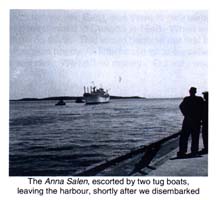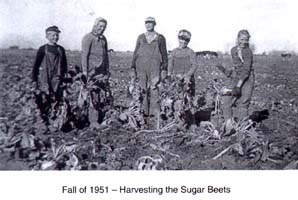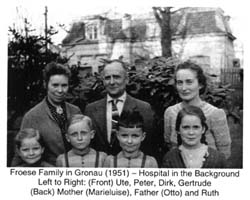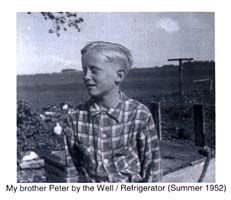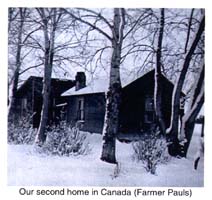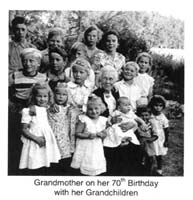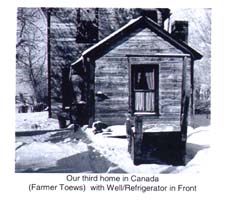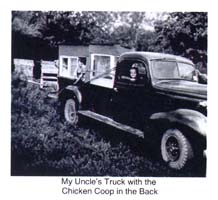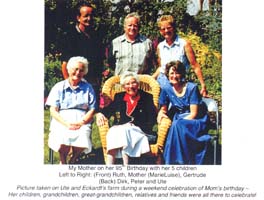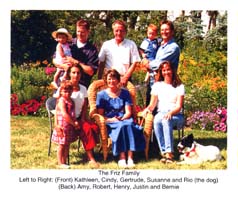Sobey Wall of Honour
Column
65
Row
15
The Otto Froese Family
My son Robert and his wife Cindy attended a convention in Halifax in 2000. While there, they visited Pier 21, I told my son that is where my family and I landed in 1951. On May 15, 2001, my husband Bernie Feddema and their son Justin flew to Halifax and were able to spend the day at Pier 21. It was exactly 50 years to the day that we arrived in Canada. My husband and children totally surprised me by having my father's name, Otto Froese, on the Wall of Honour. It was a most memorable day. The displays, the film, the train, everything was very, very special. Your staff was very kind to me and I promised that I would record what I remembered of our journey to Canada.
On January 24, 1945, we had to leave our farm in GrossMausdorf, a small village 20 km from Elbing, West Prussia (now Poland). We left by horse and buggy with very few belongings, including down comforters and one photo album. We hoped to return home soon. My father was 52, my mother 39, my stepsister Ruth 20 , I was 7, my brothers Peter (turned 5 that day) and Dirk 2, and my little sister Ute was 10 months old. Our nanny Herta was also with us. Shortly after we left, we met up with more family, my Aunts and cousins.
The following years we endured very difficult times. My stepsister Ruth was taken away by the Russians to a work camp in Siberia. For some unknown reason, they did not arrive there and ended up in prison at Graudenz. After most of them died, they let the few that were still alive go. Shortly thereafter, Ruth became very ill. Some kind of people looked after her. By a miracle, she found us in Kublitz by Stolp, Pommem. I was sick, close to death with typhus. When she arrived, my mother and Herta also became ill with Typhus, so Ruth looked after us children. We endured many, many hardships; walking many kilometres for a 2 liter can of milk, being shot at, and never having enough food, just to name a few.
After a few months, we traveled on to Limbach, East Germany, by cattle freight train. There were 52 people packed into one cattle freight car. We were the last to enter, so Mother and Herta had to each place a child on their lap. My Father's duty was to dump the 2 potties that we all used out the door as we traveled. Before arriving at out destination, Ute became very sick with pneumonia and was admitted to the hospital in Lõbau. My mother (who also a Nurse) stayed with her, and the rest of the family continued on to Limbach. After some time, Ute recovered and Mother and her joined us in Limbach. Had it not been for my mother's perseverance staying by Ute's side, feeding and caring for her, she surely would have died.
In Limbach we had warm accommodations above a factory that was owned by the Wemers. Father and Ruth worked in the factory. Everyday at noon my Father would receive a pail of soup from the soup kitchen. It was very watered down, but it was all that we had.
By the grace of God, my Mother's parents who were in Westfalen, West Germany, located us. Her father Gustaf Andres came to visit. He entered the courtyard where children were playing, and asked her to take him to her Mother. What a joyous reunion! We shared with him our daily soup but our Grandfather could not eat it. After he returned home, they sent us food packages, including Westfalian Pumpernickel. How delicious that was! They wanted us to come to West Germany, but this was not easy.
In 1948, we illegally crossed the border at night and lived with my grandparents, Aunt Charlotte, Uncle Hans, and Uncle Walter. They shared their small living space with us and our family had to be partially separated. My brother Peter stayed with our Uncle Hans and Aunt Irmgard Dyck in Ritschbei Stade; my two younger siblings were with our Uncle Horst and Aunt Christel Wiebein Oppenwehe; and Ruth worked for a farmer. I went to school in Oppendorf. After a time, we acquired a place in a small village called Haldem, and stayed with a farmer named Wilhelm Piel. We had only a short bicycle ride to my Aunt and Uncle. We went to school and had friends. We also attended the Lutheran Church. My father worked as a labourer, which was difficult for him because he was not used to such physical labour. (Before being forced from our home, Father had a number of workers on the farm, and Mother had help in the kitchen, garden, and a nanny for the children.)
In 1949, Ruth started Nursing School in Osnabrück. My brother Peter and I were sent at different times during the holidays to camp in Espelkamp for 2 weeks because we were undernourished. We received very good food and lots of rest. I gained 7 pounds!
I remember the family receiving care packages in Haldem from the MCC (Mennonite Central Committee) U.S.A. The packages contained non-perishable food, clothing and blankets. Also included was a New Testament Bible in German and inside it said "A Good Will Christmas Gift From Your Friends in America In the Name of Christ." I still have that bible today.
In 1950, my father received information from C.F. Klassen of M.C.C. that we could immigrate to Uruguay. In 1951 Canada opened its doors to refugees from Prussia. We were very happy to be going to Canada instead of Uruguay. We stayed in Gronau for some time. Gronau was a very primitive immigration camp run by the M.C.C. This is where we were examined very carefully before we could depart. Canada did not want any sick immigrants.
We left Bremerhafen on May 5, 1951 with 4 wooden boxes constructed by the carpenter in the village. I was 12 years then and printed the following on the boxes:
c/o Halifax Mennonite Board of Colonization Saskatoon, Saskatchewan, Canada
Our ship was the Anna Salen. My father was 57 years old at the time. He said that he left Germany, because of us. He wanted his children to have a future.
The sea voyage was 9 days. I remember big barrels being placed around the deck for many people that were seasick. The staff also made sure that we all went on deck for fresh air. My Mother, sister, cousin, and me had a cabin with 2 bunk beds. Mom's sister Irmgard Dyck, had the cabin beside us with her 3 daughters: Christine, Gisela and Susanne. My father and brothers were in a big room with at least 40 people. We did not get any fruit and Coca Cola was the beverage. (It took many years for me to drink Coke again). My sister Ute recalls one of the employees giving her an orange while she was playing on deck. She returned to the family and shared that orange with us.
One day while I was on deck, I recall overhearing two German men speaking about Anna Salen. They mentioned that the ship was too narrow and long for ocean voyages and thought its' structure could crack in the middle during rough sea. This had me very nervous until we landed safely in Canada.
The following is a diary that my mother wrote just before we left Germany and while we were on the ship. I have translated it into English as well:
BOAT VOYAGE DIARY FROM MARIELUISE FROESE
26 April 1951- Goodbye Fest in the Deldensall. Very festive and happy.
28 April 1951- Departure from Gronau to Bremen to the Overseas Building. Mr. Gerbrandt was at the train station.
30 April 1951 - Wonderful sermon in the Church Room. Aunt Ella Froese (Otto Froese youngest sister), came to see us.
05 May 1951- By bus to Bremen Neu-stadt. Very boring trip to Bremerhafen. Big Hall. Checking the necessary papers and then to the ship. Supper. The departure not even noticed. Two tugboats pulled the proud Anna Salen out of the harbour. Meal was fantastic.
07 May 1951 - Very nice weather. Again, lifeboat drill. Cruising along the Scottish Highlands between the Orkney Islands.
08 May 1951 - Again sunshine. Everybody out on deck. Cool breeze. Lots of fun - got tanned. Everybody happy. Night Wind # 6.
09 May 1951 - Fog. Seasick. Ship 6 meters up and down.
10 May 1951 - Wind # 8. Swells up to 20 meters high.
11 May 1951 - Rough sea. We look forward to the end.
12 May 1951 - Sunshine. The sick are in a good mood. Outside darning socks. Small child with bowel obstruction. Family Peters were dropped off in St. Johns, Newfoundland. Wonderful lit city. High rock peeks on both sides of harbour. At 12 midnight.
13 May 1951 - Fog, rain, waves.
14 May 1951 - Sunshine, we enjoy the last day of our sea voyage. At noon Halifax in sight. Sign, "Welcome to Canada".
15 May 1951 - Sunny, Spring morning. Noon our train is leaving. The harbour stretches out, dipped in the sun, like in a fairy tale.
Listed below are Mennonites that were on the ship with us. My parents knew most of them from Prussia.
Bruno and Elfreide Penner, Children: Elfreide, Hannelore, Udo, Ursela (Manitoba)
Johannes and Irmgard Dyck (Mother's sister), Children: Hans, Fredrich, Marieluise, Christine, Wilhelm, Gisela, Susanne (Coaldale, Alberta)
Erich and Mietze Classen, Children: Helmut, Manfred, Rosemary, Ingrid (Alberta)
Herbert and Annelise Schmiegelt [Classen] (Alberta)
Agneta Epp, Children: Heinz, Herta, Gerhard, Brigitte (Coaldale, Alberta)
Jasch and Hilde Neufeld (Alberta)
Klaus and Resi Driedger (Alberta)
Otto and Mariluise Froese, Children: Ruth, Gertrud, Peter, Dirk, Ute (Coaldale, Alberta)
Kurt and Kathe Wiebe, Children: Marianne, Horst, Helmut, Echardt, Karl Heinz (Coaldale, Alberta)
Amo and Herta Goertzke, Children: Ernst, Trude (Coaldale, Alberta)
We received our Landed Immigrant stamps then were told we would go to Coaldale, Alberta, as sugar beet workers. It was quite a shock for my parents, as they knew from back home it was very hard work. We immediately boarded the train that was stationed outside Pier 21 and spent the next 5 days traveling across Canada. The charge to eat in the diner car was $5.00 per day, per person. That meant $35.00 for the family. After two days, we received the money and bought food ourselves - considerably cheaper. The train was a coal engine, so we were always very black from the soot. Mother was always telling us to wash up. At first there was a lot to see. The train stopped in Winnipeg where we enjoyed some ice cream. It was absolutely delicious. As we traveled through Saskatchewan, Mom said to us to wake her when we saw a tree. We did not have to wake her!
Arriving in Coaldale a Mennonite farmer, Mr. Berg, was there to pick us up in a ½ ton truck. He spoke German. He and his family had immigrated to Canada in 1948. When we drove up to the farmer yard, there stood a little wooden house on skids. This would become our first home in Canada. No electricity, no plumbing, but Mom was happy. A little house all to ourselves! He supplied us with a sack of flour, sugar, potatoes, and milk. We had no money. Our way was paid by the M.C.C., which we were going to pay back.
On Sunday, we drove with the Berg family to the Coaldale Mennonite Church. The service was in German and the congregation greeted us warmly. Mother soon played the piano in the church. We did not start school until September that year. We attended the Crystal Lake School and Mrs. Jackson was my teacher. September 1951, I also celebrated my 13th birthday. I wished for a big bag of oranges, and I got them! My mouth got sore from eating to many.
Sugar beet work was hard. The mosquitoes were in great numbers and we suffered. The fall of 1951 was one of the worst years. We started at 7:00 a.m. and worked until 6:00 p.m. My little sister spent some time on the field with us. Mom would leave a little sooner to prepare supper. We had to miss a lot of school due to work. After working through 3 books on the English language, I was placed in Grade 7. It was not easy. We were often called names by the other school children, although we had nothing to do with World War II.
During the summer holidays, when we were not working in the beets we picked beans for farmers for 2 cents per pound. We would be taken by school bus to the farm. On a good day, I would pick 250 pounds - $5.00! At the end of the day, each person's sacks (which were tagged with their name) were weighed and we were paid cash. That was great!
After the beets were out, farmer berg told us that he needed a family with older children. We had to find another place to work and live. The groceries that farmer Berg bought for us were added, then deducted from our sugar beet payment in the Fall. When he got his first beets payment, he bought a car. We did not get paid, but he still expected us to move. A farmer by the name of Pauls, lived in the area. He let us live in a little wooden house that he had on his property. The following year, Ruth worked in the Coledale Hospital, and we worked for another farmer, Peter Langemann. Farmer Langemann had approximately 20 acres of sugar beets, whereas Mr. Berg had about 30-40 acres. While working for Langemann, we lived in the Pauls, then the Toews house. Our way of getting around was by walking, cycling or hitchhiking. Just outside our house was a cemented hole (about 3-4 meters deep) covered with a wood door that we used for our drinking water supply. The water was trucked in. In this well was a pail on a long rope where we kept our perishable foods for cold storage.
One winter day, Mom and us kids were sorting potatoes and turnips for a farmer in a cellar. When it was time to go home, we could not open up the door. A large snowdrift has blocked it. After pushing we were able to make a small opening for my brother to squeeze through. I thought we would have to spend the whole night there before someone would miss us. But, we had turnips to eat!
Sugar beet work is seasonal, so my Father did any kind of farm work and also worked at a Lethbridge meat processing plant, the CPR extra gang and a northern Alberta lumber camp.
The family and extended family is very important. Christmas, anniversaries and special birthdays are always a reason to celebrate. My Grandmother's 70th birthday was in 1952. My Uncle and family came from Saskatchewan by truck with a chicken coop on the back and a mattress on the floor.
We spent almost 5 years working in the sugar beets, and were able to pay back the M.C.C. for our sea voyage to Canada. Since we worked 2 years on the farm, the government paid our train fare for us. My father did construction work in Calgary and in August 1955, the family moved to Calgary into our own house. It was a two-story house built in 1912, and cost $6000 which was purchased with a $2000 down-payment. What luxury.. Plumbing, electricity and a telephone!
The older children all contributed monetarily to the house. Ruth was working as a Nurse. My mother had boarders and did housecleaning. Ute and I also went into Nursing. My 2 brothers became electricians and later Peter returned to school to become a teacher. Dirk started his own successful electrical business.
Father worked in construction until he was 70 years old. He enjoyed his retirement. He returned to Germany several times to visit his brother and sisters. My mother's mother, 3 sisters and one brother and their families all immigrated to Canada.
We joined the First Mennonite Church in Calgary, which is a very important part of our life. God has been very good to us. Ruth married an immigrant with a similar background to ours. They live in Kindersley, Saskatchewan. Peter married a girl from Nova Scotia and lives in Calgary. Dirk married a girl from Saskatchewan and lives in Sundre, Alberta. Ute married a farmer who also immigrated as a boy and was on the same ship as us. The live in Rosemary, Alberta.
While working at the Edmonton University Hospital in 1962, I met my husband-to-be. He had been transferred from a hospital in Yellowknife. He had only been in Canada a very short while when an old, drunk, native Indian had shot him in the leg. While hospitalized in Yellowknife, an infection set into the wound, so he was transferred to an Edmonton hospital, where he would have his leg amputated. I was working in this hospital, and was called in to translate. Henry refused to have his leg amputated and would not sign the consent forms. They initially wanted to amputate above the knee, then below. After a number of operations to clean out the wound, he was discharged in December 1962. He is able to walk and has only a slight limp when he is tired.
The government wanted to send him back to Germany, and would even pay his way. He said no. He was left with a hefty hospital and doctor's bill. A lawyer looked into the matter to determine whether the Native Indian who shot him could be required to pay for the medical bills. But the lawyer said "you can't suck blood from a stone". He was also too old to do any time for his crime. Because of the circumstances, the medical bills were somewhat reduced. He paid a established amount every month until it was all paid.
With all the hardships we went through, my parents never complained. Every year got better and better. Canada is a great country. We all love our new homeland, its people and open spaces. My Father passed away at the age of 90 years and my Mother is 95 years old now, living on her own in a seniors apartment. From the seven people that arrived on Pier 21 on May 15th, 1951, we are now 57 proud Canadians. Thank You Canada!!!
Psalm 107-1: "O give thanks unto the Lord, for his is good, for his mercy endureth forever."
(This is the prayer we said after each meal.)
Gertrude Froese (Friz)
